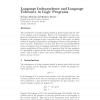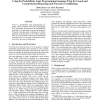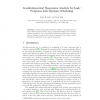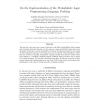2236 search results - page 1 / 448 » Language Independence and Language Tolerance in Logic Progra... |
ICLP
1994
Springer
15 years 3 months ago
1994
Springer
The consequences of a logic program depend in general upon both the rules of the program and its language. However the consequences of some programs are independent of the choice ...
114
click to vote
IJCAI
2007
15 years 29 days ago
2007
P-log is a probabilistic logic programming language, which combines both logic programming style knowledge representation and probabilistic reasoning. In earlier papers various ad...
ESOP
2003
Springer
15 years 4 months ago
2003
Springer
Abstract. A goal-independent suspension analysis is presented that infers a class of goals for which a logic program with delays can be executed without suspension. The crucial poi...
203
click to vote
ICLP
2009
Springer
16 years 5 days ago
2009
Springer
We address how to write programs for distributed computing systems in which the network topology can change dynamically. Examples of such systems, which we call ensembles, include ...
CORR
2010
Springer
14 years 11 months ago
2010
Springer
The past few years have seen a surge of interest in the field of probabilistic logic learning and statistical relational learning. In this endeavor, many probabilistic logics have...




